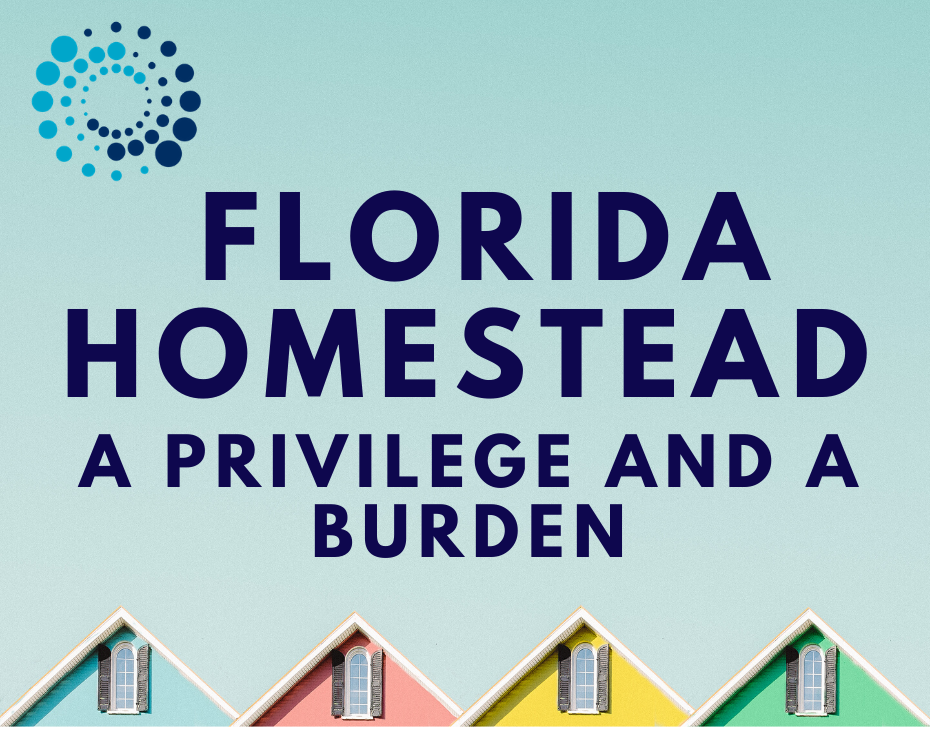The Florida Constitutional Homestead exemption can be viewed as both a privilege and a burden. A privilege as it offers protection, but a burden as it places limits as to what you can do with your property after death.
What makes property “homestead?”
For estate planning purposes, we assess status of homestead at the time of death. These four factors determine homestead status:
- Property owned by the person that died (we will call this person the decedent)
- The decedent was a Florida resident
- The property was the residence of the decedent or his/her family
- The property meets the physical requirements of the Florida Constitution
What are the physical requirements needed for Florida homestead?
Homestead is limited to 160 acres of rural land or one-half acre of municipal land. You can only have one homestead.
What are the privileges of homestead?
Homestead status protects your family home from nasty creditor claims. The State of Florida values the principle that people are entitled to live beyond the reach of financial misfortune and the demands of creditors. This means a creditor cannot force the sale of your home to satisfy a judgment. This is why many purchase a Florida homestead to avoid creditors.
What restrictions (burdens) are on the devise of a homestead?
You cannot freely devise your homestead if you have a spouse or minor children. Your surviving spouse and minor children will inherit Florida homestead property, regardless of the provisions of your Will. If the property owner did not have minor children, the share of the spouse depends on whether there are adult children.
What if I leave behind a spouse and minor children?
Per Florida law, the surviving spouse receives a life estate in the property, with the remainder to the descendants. As you can imagine, the way this plays out can greatly complicate and disadvantage families, especially blended families. Keep in mind that a married couple usually owns a home as tenants by the entirety and these homestead rules do not apply. However, when the first spouse dies, the homestead provisions kick in if the home and/or owner both satisfy the homestead requirements.
What if I leave behind a spouse but no descendants?
The spouse inherits all of the homestead. For your information, descendants are not only children, but a person any generational level down including kids, grandkids and more remote descendants. Aunts, uncles, and/or cousins are considered collateral heirs (not descendants
What if I had a surviving spouse and descendants?
If the property owner left behind a spouse and descendants, the surviving spouse automatically (unless waived) takes a life estate in the homestead with a vested remainder passing to the descendants per stirpes(each “branch” of the family inherits their “share”).
Can the surviving spouse choose not to take a life estate?
Yes. The spouse may elect, instead of the life estate, to take one-half interest as tenant in common with the children.
What if I have descendants but no spouse?
The homestead passes to descendants in fee simple.
What if owner had no surviving spouse and no descendants?
In that case, the owner may devise the homestead per his/her wishes, or if the owner did not have a Wil, it would pass down like any other property.
What if an invalid devise occurs?
Any improper devise fails. In that instance, the property passes as if there were no Will or Trust, like any other property would pass, but keep in mind that homestead property does not pass through probate. Homestead rights are created at the time of death. In most cases, the probate court rules on the petition confirming those rights, it does not create new rights. However, in some counties, a probate must be opened to determine homestead.
What if I do not do estate planning?
Litigation often arises, among other reasons, when no Last Will exists, if the parties separate but do not divorce, and when determining if a waiver occurred.
Can my spouse waive homestead rights?
Yes, strategic avenues exist. At times we use prenuptial or postnuptial agreements waiving homestead rights between spouses to equalize the estates. We also consider using waivers if the parties agree that the house should pass to adult children from a first marriage, rather than the second spouse.
Can my spouse disclaim homestead rights?
Yes. The surviving spouse may disclaim this interest.
Does the homestead exemption pass to the new owners?
No. Homestead status terminates with the decedent. The new owner may acquire a new homestead exemption.
We hope that was helpful trying to navigate tricky Florida homestead issues. Feel free to write to us to discuss more.
Lori Vella is an Estate Planning and Business Attorney. She works virtually throughout Florida and New York, but has her home office in Tampa, Florida. She is mom to a little boy which ignited the passion for helping other families. She and her son enjoy car rides, playgrounds and taking mini-adventures. They also have an organic garden that surprisingly yields vegetables. Lori considers herself well-versed in Seinfeld and welcomes any trivia!
Disclaimer: The Law Office of Lori Vella’s website contains general information directed to Florida residents. This firm does not intend to give legal advice through its pages and/or blog. If you need legal advice, we encourage you to find an attorney licensed in your state. This language on this website does not create an attorney-client relationship between you and this firm.

